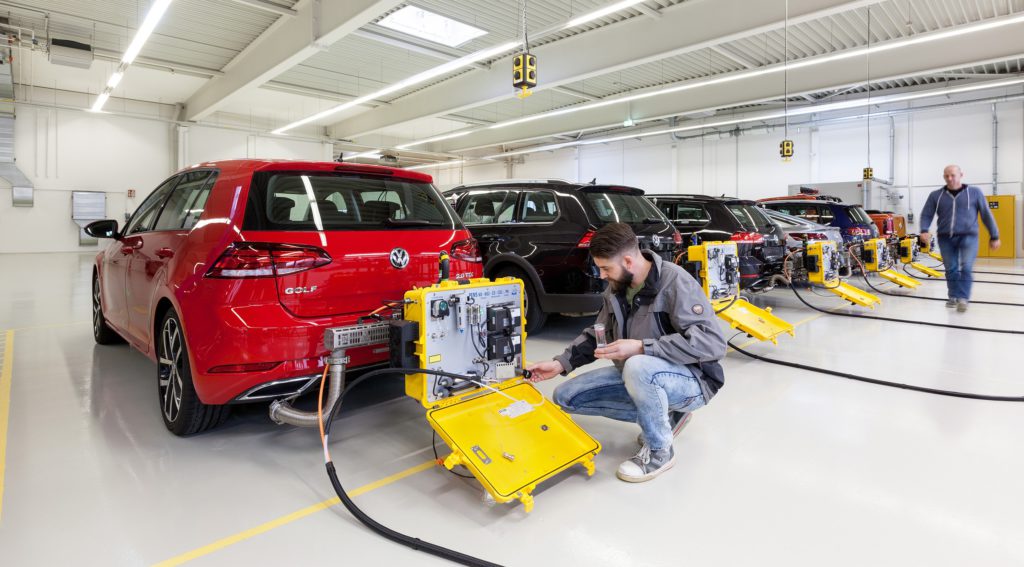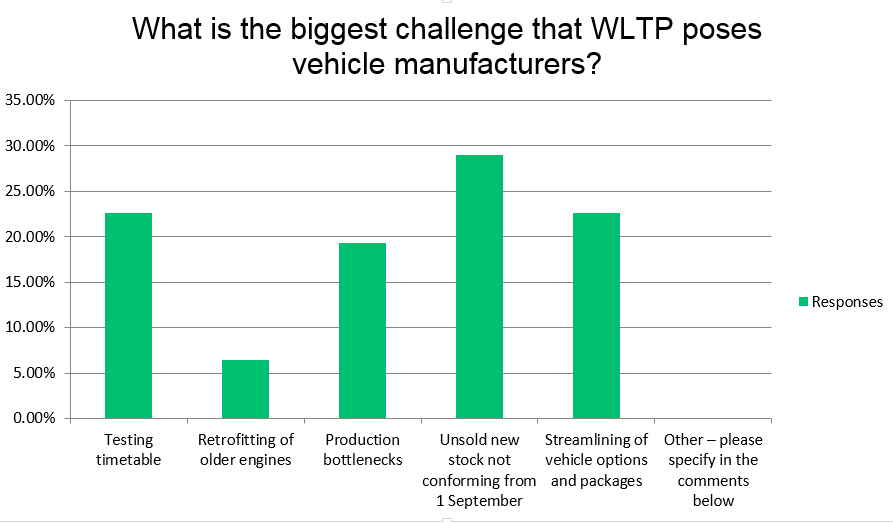Survey results: What are the biggest perils of WLTP for manufacturers?
03 August 2018

3 August 2018
With all vehicles needing to pass WLTP protocols by 1 September, manufacturers are racing to ensure their fleets are ready, while experiencing some headaches along the way.
Autovista Group asked readers of the Daily News Brief what would cause the most problems for vehicle manufacturers as they prepare to meet the deadlines.
The leading concern amongst respondents was the issue of unsold stock that does not conform to WLTP standards from 1 September, with 29% of the vote. While manufacturers have had some time to ensure vehicles are ready, there is still a large amount of stock that is as yet unregistered that is not compliant with Euro 6d-TEMP. Volkswagen (VW) is reported to be looking to hire parking lots to store vehicles while it figures out what to do with them, while others are exploring options. One answer may be to pre-register vehicles, although this would inevitably wipe some value from them.
 In equal second with 23% of the vote, the testing timetable and streamlining of vehicle options and packages was a concern for some. While separate issues, these two are linked in some way. WLTP requires every possible combination of vehicle to be tested, meaning manufacturers have to submit potentially hundreds of the same models depending on whether they can have alloy wheels fitted (and different sizes), in-car entertainment equipment, climate control systems, safety options and so on. Therefore getting everything tested in time is certainly a challenge.
This may, therefore, mean that carmakers will streamline their options offered, or merge a number of additional extras into packages, which would reduce the number of tests that they would need to carry out. It would also simplify things for the consumer when it comes to buying their vehicles.
Third in the poll with 19% of the vote was the issue of production bottlenecks. Volkswagen has been vocal in the issue of bottlenecks caused by WLTP while other manufacturers are experiencing similar issues. Carmakers are unlikely to build vehicles until they know they are compliant with the latest testing procedure and its requirements. VW is pausing production on some models. However, this will inevitably cause production issues of other vehicles as they then play catch-up to meet demand.
Finally, 6% of respondents felt that retrofitting of older engines would be the biggest challenge resulting from WLTP. This is an option for manufacturers, adding things like petrol particulate filters (PPFs) to older vehicles still in stock to ensure they are compliant, similar to new models coming off the lines. However, this would be expensive, and potentially the last option for manufacturers to explore.
In equal second with 23% of the vote, the testing timetable and streamlining of vehicle options and packages was a concern for some. While separate issues, these two are linked in some way. WLTP requires every possible combination of vehicle to be tested, meaning manufacturers have to submit potentially hundreds of the same models depending on whether they can have alloy wheels fitted (and different sizes), in-car entertainment equipment, climate control systems, safety options and so on. Therefore getting everything tested in time is certainly a challenge.
This may, therefore, mean that carmakers will streamline their options offered, or merge a number of additional extras into packages, which would reduce the number of tests that they would need to carry out. It would also simplify things for the consumer when it comes to buying their vehicles.
Third in the poll with 19% of the vote was the issue of production bottlenecks. Volkswagen has been vocal in the issue of bottlenecks caused by WLTP while other manufacturers are experiencing similar issues. Carmakers are unlikely to build vehicles until they know they are compliant with the latest testing procedure and its requirements. VW is pausing production on some models. However, this will inevitably cause production issues of other vehicles as they then play catch-up to meet demand.
Finally, 6% of respondents felt that retrofitting of older engines would be the biggest challenge resulting from WLTP. This is an option for manufacturers, adding things like petrol particulate filters (PPFs) to older vehicles still in stock to ensure they are compliant, similar to new models coming off the lines. However, this would be expensive, and potentially the last option for manufacturers to explore.
 In equal second with 23% of the vote, the testing timetable and streamlining of vehicle options and packages was a concern for some. While separate issues, these two are linked in some way. WLTP requires every possible combination of vehicle to be tested, meaning manufacturers have to submit potentially hundreds of the same models depending on whether they can have alloy wheels fitted (and different sizes), in-car entertainment equipment, climate control systems, safety options and so on. Therefore getting everything tested in time is certainly a challenge.
This may, therefore, mean that carmakers will streamline their options offered, or merge a number of additional extras into packages, which would reduce the number of tests that they would need to carry out. It would also simplify things for the consumer when it comes to buying their vehicles.
Third in the poll with 19% of the vote was the issue of production bottlenecks. Volkswagen has been vocal in the issue of bottlenecks caused by WLTP while other manufacturers are experiencing similar issues. Carmakers are unlikely to build vehicles until they know they are compliant with the latest testing procedure and its requirements. VW is pausing production on some models. However, this will inevitably cause production issues of other vehicles as they then play catch-up to meet demand.
Finally, 6% of respondents felt that retrofitting of older engines would be the biggest challenge resulting from WLTP. This is an option for manufacturers, adding things like petrol particulate filters (PPFs) to older vehicles still in stock to ensure they are compliant, similar to new models coming off the lines. However, this would be expensive, and potentially the last option for manufacturers to explore.
In equal second with 23% of the vote, the testing timetable and streamlining of vehicle options and packages was a concern for some. While separate issues, these two are linked in some way. WLTP requires every possible combination of vehicle to be tested, meaning manufacturers have to submit potentially hundreds of the same models depending on whether they can have alloy wheels fitted (and different sizes), in-car entertainment equipment, climate control systems, safety options and so on. Therefore getting everything tested in time is certainly a challenge.
This may, therefore, mean that carmakers will streamline their options offered, or merge a number of additional extras into packages, which would reduce the number of tests that they would need to carry out. It would also simplify things for the consumer when it comes to buying their vehicles.
Third in the poll with 19% of the vote was the issue of production bottlenecks. Volkswagen has been vocal in the issue of bottlenecks caused by WLTP while other manufacturers are experiencing similar issues. Carmakers are unlikely to build vehicles until they know they are compliant with the latest testing procedure and its requirements. VW is pausing production on some models. However, this will inevitably cause production issues of other vehicles as they then play catch-up to meet demand.
Finally, 6% of respondents felt that retrofitting of older engines would be the biggest challenge resulting from WLTP. This is an option for manufacturers, adding things like petrol particulate filters (PPFs) to older vehicles still in stock to ensure they are compliant, similar to new models coming off the lines. However, this would be expensive, and potentially the last option for manufacturers to explore.